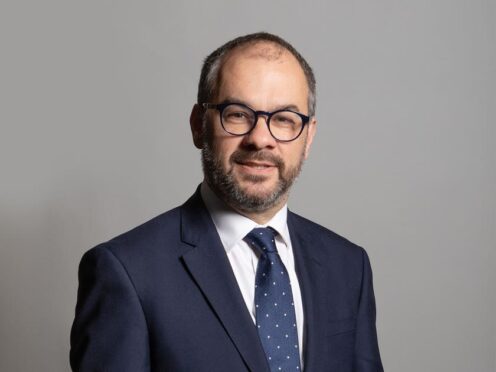
Too many Conservatives have ignored “unacceptable” language about Muslims, a former minister has said.
As the row over Lee Anderson’s comments about Sadiq Khan continued, former London minister Paul Scully criticised language used by some of his colleagues but said it was “not necessarily systematic Islamophobia”.
In an article in the Daily Telegraph on Tuesday, Mr Scully said: “In my four years as minister for London, I’ve heard colleagues support the term ‘Londonistan’ and others claiming Islamists are in charge of Britain. Both unacceptable, both largely ignored by too many people in my own party and elsewhere who should know better.
“That’s not necessarily systematic Islamophobia, the irrational fear of Islam; it’s the fear of taking a long-term decision for a brighter future to coin a phrase.”
Mr Scully has been criticised for his own recent comments in which he appeared to claim there were “no-go areas” in London and Birmingham, following Mr Anderson’s claims that “Islamists” had “got control” of the Mayor of London.
On Tuesday he said his words had been “misconstrued” and he had been trying to explain why some politicians “felt emboldened to use such terms”.
Speaking to BBC London, he said: “I’m sorry for using the word no-go areas because it was a blunt thing that actually feeds into another set of conspiracy theories and some of the language used by people like Katie Hopkins, which was absolutely not my intention.”
In his Telegraph article, he added: “My point was not to write off entire neighbourhoods, but to bring to the fore how a tiny minority can distort reality and thus the language used by Lee Anderson and others that I was there to condemn.”
He cited “the ‘Muslim patrols’ by a small vigilante group a few years ago in Tower Hamlets” and protests organised by Hizb Ut-Tahrir.
Mr Scully said: “If we don’t address these issues in a grown-up way, we cede the ground to those who want to include everyone with a different faith and, too often, a different skin colour within those headlines.
“But again, these examples are a miniscule proportion of British Muslims who dominate the coverage, discourse and popular perception by their mindless actions.
“After a decade or so of supporting and indeed championing our British Muslim communities, to be accused of being an Islamophobe basically leads me to step out of continuing that support and retreating to support communities and causes that want to have constructive dialogue. Another moderate voice lost to the debate.”

He added: “If in condemning inflammatory behaviour, I get wrapped up as a bad guy, then that’s one more ‘good man’ changing his course to do nothing in the future. Another moderate voice lost to the cause that many of us have shared for so long.”
Mr Scully had been criticised by both Labour and Conservative figures for his remarks about London and Birmingham, with Home Office minister Tom Pursglove saying on Tuesday morning: “I think it would be best, again, if that comment was withdrawn.
“I don’t recognise that as being the situation in London or Birmingham, but we as politicians must always be forward leaning and on the front foot when it comes to integrating people into our communities and making sure that people are able to play a full contribution in UK society.”
The row over Mr Anderson’s comments about the Mayor of London continued on Tuesday, with ministers repeatedly refusing to describe his words as “Islamophobic”.

Enjoy the convenience of having The Sunday Post delivered as a digital ePaper straight to your smartphone, tablet or computer.
Subscribe for only £5.49 a month and enjoy all the benefits of the printed paper as a digital replica.
Subscribe